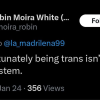[NC is Naomi Cunningham, KT is Katie Horsburgh, 23-year-old board member of ERCC]
NC: Discussion here of having NB ppl in women-only organisation.
KT: There are no men at ERCC. Open to all genders
NC: Am talking about staff
KT: I think website says we create women-only place.
NC: Says no men
KT: Correct
Still playing stupid games. “There are no men at ERCC; ERCC is open to all genders.”
NC: You are aware some ppl think being man or woman is matter of biology. Can’t change. Some ppl think yes
KT: Yes they do
NC: So you are being unclear when you say “no men”.
KT: Disagree. T-I policy is on website. And we have a meeting to match ppl to support worker.
Stupid stupid stupid games.
NC: Are you saying that saying “no men” plus publishing TI policy, that means all SUs will be clear that there might be TW employed?
KT: We don’t employ any men –
NC: Not asking that. Asking if clear to all SUs
KT: In combination – policies, initial meeting – yes, clear.
In other words we play stupid games but we say so on the website and in the initial meeting so that’s fine then.
NC: Can you imagine an SU [service user] may be without your educational privileges, who might *not* understand that?
KT: We have diverse highly trained team, match the service standards, to put with right support worker
“Do you realize some people might not understand your stupid games?” “Oh we have a highly trained team to explain our stupid games to the peasantry.”
The smug malice of all this just makes my skin crawl.



